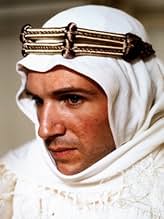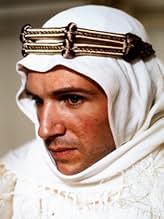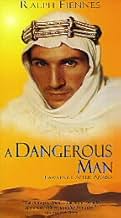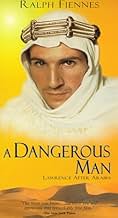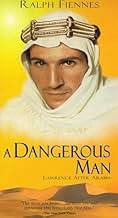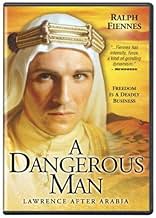Lawrence and Feisal go to argue for Arab independence at the 1919 Paris Peace Conference.Lawrence and Feisal go to argue for Arab independence at the 1919 Paris Peace Conference.Lawrence and Feisal go to argue for Arab independence at the 1919 Paris Peace Conference.
Alexander Siddig
- Feisal
- (as Siddig El Fadil)
- Director
- Writer
- All cast & crew
- Production, box office & more at IMDbPro
Featured reviews
This film is a wonderful glimpse into the stiff and devious world of frock coated 1919 diplomacy. I agree with those who already have said it is a wonderful companion piece for the more well known film about T.E. Lawrence. Fiennes gives a very deep and effective interpretation of the complex Lawrence. The recreations of Clemenceau, Wilson and Lloyd George are powerful indeed. The Versailles treaty is almost ancient history even though it had much to do with shaping today's complicated world. This film brings it into the present (or maybe us into the past). Perhaps not everybody's cup of tea but well worth seeing if you like twentieth century history, good acting and fine British television.
The great Lawrence of Arabia fights side-by-side with the Arabs to help save Arabia from Turkish invaders. Fade to black. Roll credits. End of story.
Well, not entirely. A Dangerous Man: Lawrence After Arabia, tells more. In this movie, T.E. Lawrence (Ralph Fiennes) goes to Paris with Feisal (Alexander Siddig) to argue for Arab independent rule during the 1919 Paris Peace Conference. In Paris, instead of the shifting sands of the desert, Feisal and Lawrence encounter shifting political alliances.
If you're interested in current Middle East affairs, this movie provides some insight. It portrays the division of the Middle East into "spheres of influence." England, France, and the United States would each be responsible for a particular sphere. Feisal and Lawrence want Great Britian to make good on their wartime promise to create Syria as an independent Arab state. However, Britian now supports France as the eventual ruler of Syria.
A brief scene shows Lawrence watching a worker oiling a chandelier. Lawrence explains to his companion, "If France gets Syria, we [the British] get the Persian Gulf." His companion replies that if Britian must choose between loyalty to Feisal or access to petroleum... well, Feisal doesn't stand a chance.
Through Feisal, we get some sense of how the Arabs must have felt as their homeland was carved into pieces of pie for the powerful, oil-hungry Western world. It's interesting that, through most of the movie, Feisal speaks to other officials only through Lawrence although Feisal speaks fluent English. In fact, Feisal relies on Lawrence to not only interpret but, in some cases, to create his thoughts. While this may or may not be historically accurate, it certainly highlights Feisal's precarious position.
The movie briefly questions Lawrence's motives in helping Feisal. (`I want Syria to be our first brown dominion,' says Lawrence, `and I can do it with my Arabs.') Ultimately, though, it portrays him as a well-intentioned man caught up in politics that are out of his control. Syria did, in fact, go to France. In the 1920s, however, Britian supported Feisal as ruler of a new Arab kingdom - Iraq.
Terrifically acted by Ralph Fiennes and Alexander Siddig, this movie wraps up the loose ends of the Lawrence of Arabia legend. By the time the credits roll, you know much more about who, how, and why than you did before.
Well, not entirely. A Dangerous Man: Lawrence After Arabia, tells more. In this movie, T.E. Lawrence (Ralph Fiennes) goes to Paris with Feisal (Alexander Siddig) to argue for Arab independent rule during the 1919 Paris Peace Conference. In Paris, instead of the shifting sands of the desert, Feisal and Lawrence encounter shifting political alliances.
If you're interested in current Middle East affairs, this movie provides some insight. It portrays the division of the Middle East into "spheres of influence." England, France, and the United States would each be responsible for a particular sphere. Feisal and Lawrence want Great Britian to make good on their wartime promise to create Syria as an independent Arab state. However, Britian now supports France as the eventual ruler of Syria.
A brief scene shows Lawrence watching a worker oiling a chandelier. Lawrence explains to his companion, "If France gets Syria, we [the British] get the Persian Gulf." His companion replies that if Britian must choose between loyalty to Feisal or access to petroleum... well, Feisal doesn't stand a chance.
Through Feisal, we get some sense of how the Arabs must have felt as their homeland was carved into pieces of pie for the powerful, oil-hungry Western world. It's interesting that, through most of the movie, Feisal speaks to other officials only through Lawrence although Feisal speaks fluent English. In fact, Feisal relies on Lawrence to not only interpret but, in some cases, to create his thoughts. While this may or may not be historically accurate, it certainly highlights Feisal's precarious position.
The movie briefly questions Lawrence's motives in helping Feisal. (`I want Syria to be our first brown dominion,' says Lawrence, `and I can do it with my Arabs.') Ultimately, though, it portrays him as a well-intentioned man caught up in politics that are out of his control. Syria did, in fact, go to France. In the 1920s, however, Britian supported Feisal as ruler of a new Arab kingdom - Iraq.
Terrifically acted by Ralph Fiennes and Alexander Siddig, this movie wraps up the loose ends of the Lawrence of Arabia legend. By the time the credits roll, you know much more about who, how, and why than you did before.
Ralph Fiennes takes on the dangerous Peter O'Toole role of T. E. Lawrence in "A Dangerous Man," about Lawrence of Arabia, who knew his way around the desert in World War I, bewildered by red tape in the 1919 Paris Peace Conference that eventually helped give us World War II and possibly World War III (though the 1921 Cairo Conference actually divided the former Ottoman Empire into lines in the sand).
Notable are Denis Quiley as Lord Curzon and Michael Cochrane as Winston Churchill, though the whole cast is fine.
Don't think of this as a sequel to David Lean's masterpiece. In "Lawrence of Arabia" O'Toole played Lawrence as the tragic archetype of a liberator no longer needed once "his" chosen people had their freedom.
Fiennes' Lawrence is up against a worse adversary than the Ottoman Empire: entrenched bureaucracy (what today we call the swamp). British civil servants who probably spent their War years in Whitehall smugly do their best to hamper Lawrence's delegation and cut his legs off before his friends. All in the name of aiding the French.
The ins and outs of governmental duplicity (it existed on medieval China, the British Empire and modern America amongst these same breed of bureaucrats) are easy to follow as they do their best to sideline Lawrence and the Arabs as the British and the French gaily scheme.
This movie has a good cast but shares no production values with Lean's magnum opus. Consider them two separate types of beast.
BTW, it takes all the rumors of Lawrence's private life as gospel. That will fascinate rather than irritate the viewers it's most likely to attract.
Notable are Denis Quiley as Lord Curzon and Michael Cochrane as Winston Churchill, though the whole cast is fine.
Don't think of this as a sequel to David Lean's masterpiece. In "Lawrence of Arabia" O'Toole played Lawrence as the tragic archetype of a liberator no longer needed once "his" chosen people had their freedom.
Fiennes' Lawrence is up against a worse adversary than the Ottoman Empire: entrenched bureaucracy (what today we call the swamp). British civil servants who probably spent their War years in Whitehall smugly do their best to hamper Lawrence's delegation and cut his legs off before his friends. All in the name of aiding the French.
The ins and outs of governmental duplicity (it existed on medieval China, the British Empire and modern America amongst these same breed of bureaucrats) are easy to follow as they do their best to sideline Lawrence and the Arabs as the British and the French gaily scheme.
This movie has a good cast but shares no production values with Lean's magnum opus. Consider them two separate types of beast.
BTW, it takes all the rumors of Lawrence's private life as gospel. That will fascinate rather than irritate the viewers it's most likely to attract.
I have seen the film again, read the other reviews and I too consider this movie excellent in its own right, the stars are spot on and the acting very believable. It is a definite companion piece to Lean's "Lawrence of Arabia", I have the 2 DVDs side by side in my collection at home. It might not have the trainwrecks and the battles with the Turks, but the politics of the time are very important, also very interesting, emphasised more strongly in this film than "Lawrence of Arabia". History buffs will lean toward this film I feel, as I have done. You will not even notice it was made for TV, the story is so gripping. Ralph Fiennes is remarkable in the role of T.E.Lawrence, working as translator and for the Arab cause, King Feisal perfectly portrayed by the young actor Alexander Siddiq, the others the politicians including Michael Cochrane as Winston Churchill are first rate, Nicholas Jones as Lord Dyson is chilling. To sum up, extremely good, an important and interesting film (not dry as someone said, the translation scenes, the speeches for world leaders had me on the edge of my seat) One has to look back at history to understand what is going on today. In the main, all the historical facts are in place here, and therefore one can at least, partially understand the complex situation in the region in our present age as we tune in to the News. Comment from Malcolm in Toronto, May 27th 2007
Ralph Fiennes makes a very convincing impersonation of the enigmatical T.E.Lawrence with all the complications of his case, especially concerning his integrity and political departure from the public scene, Ever since he made his career that brought him world fame and interest, it has been wondered who he really was, he became an enigma from the start, and that enigma has never been solved, while the main result of this film is to add to the enigma. Alexander Siddig makes as memorable a figure of Prince Feisal as Omar Sharif did of Sherif Auda, while the characters of Curzon, Clemenceau, Churchill, Wilson and the others enrich the film with political interest. The main story of the film is the account of how everything went wrong in the peace conference of Paris as Lawrence and the Arabs got practically nothing as a result of their efforts but mainly only were driven over and Lawrence even practically driven into exile, at least forced into disappearing anonymity, The film is therefore most like a documentary and extremely interesting as such, since it is impartial, tells the truth and is meticulous about it. Nothing can vie with or excel the splendour of David Lean's great epic, but one almost feels inclined to regard Ralph Fiennes' characterisation of Lawrence as more real and convincing than Peter O'Toole's.
Did you know
- TriviaJoseph Fiennes, in his uncredited debut, plays brother Ralph Fiennes' character Lawrence's younger brother. He had to sneak out of school during a lunch break to play the bit-part.
- Quotes
T. E. Lawrence: All men dream; but not equally. Those who dream by night in the dusty recesses of their minds Awake to find that it was vanity; But the dreamers of day are dangerous men. That they may act their dreams with open eyes to make it possible.
- ConnectionsEdited into Great Performances: A Dangerous Man: Lawrence After Arabia (1992)
Details
- Release date
- Country of origin
- Language
- Also known as
- A Dangerous Man
- Production companies
- See more company credits at IMDbPro
Contribute to this page
Suggest an edit or add missing content

Top Gap
By what name was A Dangerous Man: Lawrence After Arabia (1992) officially released in Canada in English?
Answer
